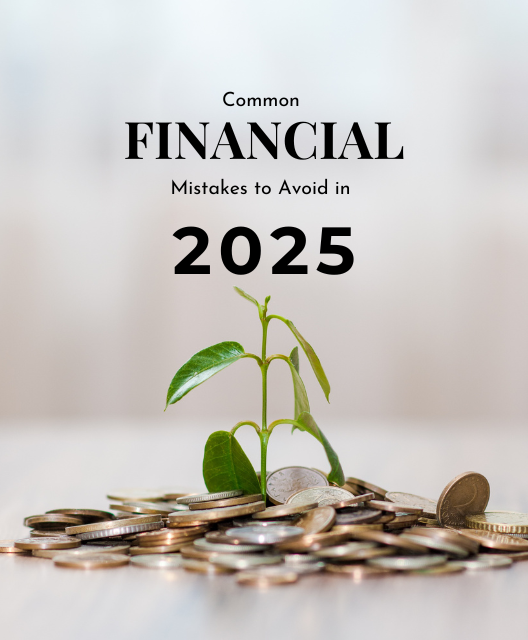Financial stability is a top priority for most individuals and families. Yet, every year, people continue to make avoidable mistakes that hamper their progress toward achieving financial independence. As we step into 2025, let’s explore the ten most common financial mistakes people make and how to avoid them. Avoiding these pitfalls can help you secure a brighter financial future and maximize opportunities in this rapidly evolving economy.

1. Failing to Set a Budget
Budgeting is the foundation of sound financial planning, yet many individuals skip this crucial step. Without a clear budget, you’re likely to overspend and miss opportunities to save or invest.
Solution: Use apps like Mint or YNAB (You Need a Budget) to track your income and expenses. Set realistic goals for saving, spending, and investing. Stick to your plan and regularly update it to reflect changes in your financial situation.
Additionally, involve your family in the budgeting process to ensure everyone is aligned with financial goals. This collaborative approach can make sticking to a budget much easier and create a shared sense of responsibility.
2. Neglecting Emergency Savings
Life is unpredictable, and not having an emergency fund can leave you vulnerable to unexpected expenses, such as medical bills, car repairs, or job loss.
Solution: Aim to save three to six months’ worth of living expenses in a high-yield savings account. Even if you can only save a small amount monthly, consistency is key.
To make it easier, set up automatic transfers to your savings account each payday. Treat this like a non-negotiable bill to ensure your emergency fund grows steadily over time.
3. Overreliance on Credit Cards
Credit cards are convenient but can lead to excessive debt if not used wisely. High-interest rates can quickly escalate your financial obligations.
Solution: Use credit cards for essential expenses only and pay off your balance in full each month. Avoid falling into the trap of making minimum payments, as this will increase your overall debt.
Consider switching to a low-interest credit card or exploring balance transfer options to reduce the financial burden. Developing a habit of tracking your credit card usage weekly can also keep overspending in check.
4. Ignoring Retirement Planning
Many young professionals believe retirement is a distant concern. However, the earlier you start saving for retirement, the more you can benefit from compound interest.
Solution: Contribute to a retirement plan such as a 401(k) or IRA. Maximize employer matches if available, and review your investments periodically to ensure alignment with your retirement goals.
If you’re self-employed, explore options like a SEP IRA or a Solo 401(k). Diversify your portfolio and seek professional advice to optimize your retirement planning strategy.
5. Falling for Get-Rich-Quick Schemes
Scams promising high returns with little effort are still prevalent in 2025. Many individuals fall prey to fraudulent investments, losing substantial amounts of money.
Solution: Always research thoroughly before investing. Stick to reputable platforms and consider consulting with a certified financial advisor. Remember, if something seems too good to be true, it probably is.
Educating yourself on basic investment principles can help you identify red flags and make smarter financial decisions. Stay updated on regulatory advisories to avoid falling into traps.
6. Ignoring the Power of Compound Interest
The earlier you start saving and investing, the more time compound interest has to grow your money. Delaying this can cost you significantly over time.
Solution: Start investing as soon as possible. Even small amounts invested in mutual funds, ETFs, or a diversified portfolio can grow substantially over decades.
Consider opening a tax-advantaged account like a Roth IRA or investing in dividend-paying stocks to maximize your returns. Use online calculators to visualize how compound interest works in your favor.
7. Living Beyond Your Means
Trying to keep up with others by spending excessively on luxury items or unnecessary upgrades can lead to financial strain.
Solution: Differentiate between wants and needs. Adopt a minimalist mindset and focus on living within your means. Prioritize experiences and memories over material possessions.
Set clear spending limits and find joy in cost-effective activities like community events or DIY projects. Financial discipline now can lead to greater freedom later.
8. Skipping Insurance
Insurance might seem like an unnecessary expense until you face a major unforeseen event. Whether it’s health, life, or property insurance, going without coverage is a big risk.
Solution: Assess your needs and get adequate insurance coverage. Compare policies from reputable providers to find the best deals without compromising on coverage.
Reassess your insurance policies annually to ensure they’re still meeting your needs. Bundling multiple types of insurance with the same provider may also result in cost savings.
9. Ignoring the Impact of Inflation
Inflation erodes purchasing power over time, making it crucial to consider when saving or investing. Keeping too much money in low-interest savings accounts is a common mistake.
Solution: Diversify your investments into assets that can outpace inflation, such as stocks, real estate, or inflation-indexed bonds. Balance risk with reward according to your financial goals.
Additionally, periodically adjust your financial strategy to account for inflation trends. Staying proactive can help protect your financial stability over the long term.
10. Not Seeking Professional Advice
Many people attempt to manage their finances without expert guidance, often making avoidable mistakes. This is especially critical for high-net-worth individuals or those with complex financial situations.
Solution: Hire a certified financial advisor to help create a personalized plan. A professional can guide you through tax optimization, investment strategies, and wealth management.
If hiring a financial advisor is outside your budget, consider using robo-advisors for cost-effective investment guidance. Joining financial literacy groups or online forums can also provide valuable insights.
Tips for Staying Ahead in 2025
- Embrace Technology: Use financial management tools to streamline your budgeting and saving processes.
- Stay Educated: Attend seminars, read books, and follow trusted financial blogs (like ours!) to keep up with the latest trends.
- Set Realistic Goals: Break down long-term objectives into achievable short-term milestones.
- Network with Like-Minded Individuals: Surrounding yourself with financially savvy individuals can inspire you to maintain healthy habits.
To further enhance your financial knowledge, consider subscribing to newsletters or podcasts that provide regular updates and actionable insights on money management.
Final Thoughts
2025 presents new opportunities and challenges, but avoiding these common financial mistakes can set you on the path to success. By creating a budget, investing early, and seeking professional advice, you can achieve financial security and peace of mind. Let’s make this year the one where you take control of your financial future.
Take your first step now!

